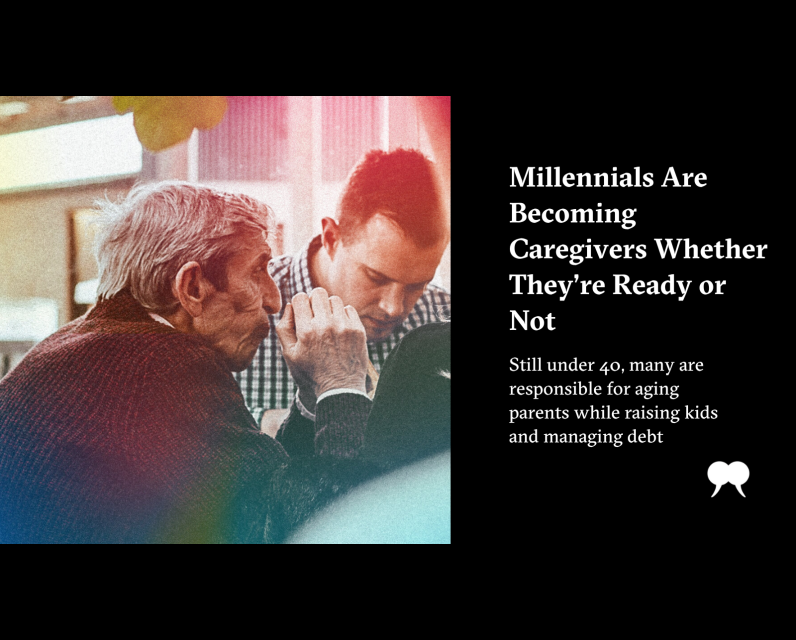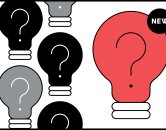Millennials Are Becoming Caregivers Whether They’re Ready or Not

I was never clear on who millennials were until I started looking into them. I suddenly felt seen. I prefer reading about places online before going to explore them, and I love e-commerce. I know some slang but not the latest trends. While I scoff at Gen’s Z TikTok obsession, I fully admit I watch the same videos on Instagram. And I, too, clung to my Blackberry for too long, convinced touchscreens weren’t for me. I’m a textbook example of my cohort.
Being a millennial has also been a key to my caregiving experience. And I’m not unique. According to the American Association of Retired Persons, or AARP, as of 2020, approximately 24 percent of caregivers in the United States are millennials. I belong to a group that is part of what I call “the new sandwich generation.”
The original sandwich generation referred to middle-aged adults, perhaps in their forties or fifties, caring for their own children and their elderly parents. The new sandwich generation has aging but not conventionally old parents. Many of our grandparents may still be alive. We have youngish kids, or maybe we’re thinking about having kids. That means there are more sandwich layers above us than below us. That means there are many different interpersonal relationships to navigate, especially in caregiving. Also that there may be multiple people who need care in different ways.
Though average life expectancy in the US and Canada now reaches into the seventies and eighties, many older adults face chronic, debilitating conditions well before then. This proportion is only expected to increase as baby boomers age. Do you know what’s also set to grow? Those of us becoming a parent while losing a parent. Given the number of millennial caregivers already out there, it’s striking how invisible we feel.
M y caregiving was characterized by a striking dichotomy: my first child was born as my dad was diagnosed with Alzheimer’s disease. While I was supporting a baby as it learned the world around it, I was also watching my not-old father—a strong, happy, capable man—regress.
I shared my journey with people I cared about, but it was hard to put into words. It still is. That tension defined my thirties. Friends who also watched a mother or father ail know it can be all consuming. It feels premature to experience their death. It feels unfair. There are so many milestones we imagine our parents will be there for that it seems to go against nature. And yet it happens.
Watching my father deal with the shrinking reality that comes with cognitive decline was like parenting without the bright horizon, the knowledge that with enough positive reinforcement, a task will get mastered and a person will grow. We would often joke that he had the easiest time hanging with his grandson, the toddler, because they had similar mental capacities. It became dark humour the more my child learned and dad forgot.
Sometimes when Dad was sick, my mom and I would commiserate. We were each dealing with temper tantrums. Hers were when Dad wanted to drive and didn’t understand why he couldn’t, so he was throwing the keys and threatening to get in the car or grabbing the steering wheel while she was driving. Mine were when my son wanted to have a toy that he couldn’t have and threw his food on the floor in protest. We laughed. More dark humour. But the undertone was starkly different. There was hope—there is still hope!—that my toddler will grow out of this phase. Dad, on the other hand, was going to move on from this phase: he was going to forget what driving was altogether, or that driving was an activity he was once able to do.
One of the things that struck me most about my dad’s decline was that I noticed it in these little moments. In her eulogy after my dad died, my sister reflected that this was the hardest part. Our dad was not a man for grand gestures or milestones. He was consistent. He showed up each day with a clear head and even temperament. He rarely got irritated. In fact, I can count on one hand the two times in childhood he lost his cool—once at a remote control when my younger brother and I wouldn’t stop fighting, the other at a dishwasher that simply stopped working. He took things one step at a time, day after day. He taught us to be present and focus on the little things.
That’s why we found the small changes problematic. What was surprising about Dad’s diagnosis and decline was that he was so able bodied. When you looked at him, he was slim, his slightly olive skin was tanned, his hair salt and pepper, and he was active. He played basketball and tennis, went biking, enjoyed going for walks, and attempted to golf. He was the picture of health. But the picture was not reality.
As my dad’s dementia advanced, my mom discovered bills had gone unpaid and that he had a couple of new credit cards. When he lost one, he would sign up for another card rather than replacing it. These little changes led Dad to a series of doctors who conducted neurologic and cognitive testing over the course of several months. While his official diagnosis was prolonged by pandemic-era delays to non-emergency health care services, the prognosis, when it finally came, was unequivocal. Dad had early-onset Alzheimer’s and was expected to live no more than five years. He was fifty-eight. From the time of diagnosis to death, my dad lived less than three years.
I luckily had a spouse who was always there to listen, but when friends would ask how my dad was doing, I never knew what to say. Did they really want to know? He wasn’t doing well. How could he be doing well? His brain wasn’t working normally, and he was never going to get better. That’s not to say I didn’t appreciate people thinking about me, or him, or our family. I most certainly did. But I found it incredibly hard to share my experience even with my closest friends. Without being in my position, it was nearly impossible for someone to understand how challenging these times were.
Caregiving is a constant slog of day-to-day decisions—what therapy may help stave off the next stage of disease, if even for a brief amount of time, or which shower bar will offer the most support without cracking the tiles on your 100-year-old bathroom wall when pulled on by a large man with a mobility issue.
According to the American Association of Retired Persons, as of 2020, approximately 24 percent of caregivers in the United States are millennials.
It took too much energy to explain the daily difficulties, to really try to make someone understand. I found support groups, primarily through Zoom, to be a somewhat helpful venting ground, but the frequency and consistency of the groups was limited. Many of the other participants were not my age. Most people with a parent ailing from Alzheimer’s were much older. I often felt isolated in my coping.
This was a theme in my search for support. When I looked for resources, everything I found was geared toward seniors. My dad wasn’t a senior. He’d never seemed old. Still in his fifties and able bodied, he wasn’t frail. His kids were young; my siblings hadn’t finished school or married. We had to come to terms with the fact that Dad wasn’t going to be there for the many things we had envisioned him being a part of. And we had to learn how to be caregivers ourselves.
M illennials, also known as Generation Y, are individuals born roughly between the early 1980s and the mid-1990s. They tended to be in grade school or secondary school on September 11, 2001, a day that changed perceptions of safety, security, and global politics. They were building careers or starting families when COVID-19 rewrote the rules of ordinary life. Perhaps most unique to millennials is they came of age in a tech-driven world.
As a millennial, you remember your first computer, your first cellphone, and every device that followed. Who can’t recall the leap from waiting for your mom to finish a call on the landline to being able to chat with friends instantly over AOL Messenger? My siblings and I spent hours playing Oregon Trail, Carmen San Diego, and SIMS on our family computer. I got my first laptop—an orange Mac—in high school. It was slow as molasses, but I felt cool having that thing to myself.
Millennials were the first to integrate that technology into how they live, work, and connect. The personal computer gave way to the internet and, eventually, social networking. That integration has now been normalized, making us the first generation accustomed to having the most up-to-date information at our fingertips, and the first to expect an instant response when messaging our partners. According to Pew Research Center, 92 percent of millennials own smartphones, compared to 58 percent of baby boomers and 74 percent of Generation X. The same study found that millennial adoption of social media also significantly outpaces that of older generations, who took up these tools more gradually. We are steeped in our online communities, sharing experiences and opinions on sites like X, Instagram, Reddit, and Facebook. We are keenly aware of our higher levels of digital literacy, especially when we have to walk our mothers or fathers through new devices or platforms.
But being the most connected generation hasn’t guaranteed upward mobility. Millennials pursued higher education at higher rates than their parents, driven by the belief that degrees would open doors to better careers. Instead, they’ve faced higher unemployment and underemployment, and a Pew Research Center study found their wage growth has been slower too.
Education also came at a steep price—63 percent of millennials carry student loan debt, a burden that’s weighed heavily on their financial stability and delayed major life milestones like buying homes or starting families. A study by the Center for Financial Services Innovation found that 57 percent struggle with financial health, citing income volatility, difficulty managing expenses, and limited savings. The 2008 financial crisis hit just as many were entering the workforce, and the COVID-19 pandemic struck as they were trying to gain ground: two economic shocks that shaped our adult lives in lasting ways.
Having watched traditional career paths collapse beneath us, we’ve redefined professional success on our own terms. Deloitte’s Millennial Survey 2020 revealed that 55 percent of millennials prioritize work–life balance and personal well-being when considering a job. According to the IBM Institute for Business Value, 72 percent believe a company should be purpose driven—a higher share than for any previous generation.
That search for balance extends beyond the workplace. Health plays a larger role than it did for our parents. Millennials exercise regularly and make more careful choices about food. They are also more apt to seek mental health services and acknowledge their psychological needs. That’s probably because they exhibit higher levels of stress, in no small part due to grinding through unstable jobs and stagnant wages. Millennials, in fact, are being diagnosed with mental health disorders more often than Gen X or boomers—and their rates of major depression are climbing faster than those of any generation before them, according to new research.
O kay, you get it. Millennials have unique traits that come from being born at a certain point in time. What does all this mean for me as a caregiver?
It means a lot! Age, experience, and life state can make caregiving more or less challenging. For millennials, it means taking on the duty while still relatively young. In fact, you may still be in “emerging adulthood.” That is, the phase between youth, with its structured steps for personal and professional progression, and adulthood, where norms and routines are more established. In other words, the stage of life you are in already includes many developmental pressures—learning to parent, advancing in your career, saving money, and having a social life. Adding caregiving to the mix can be daunting. And for many, it’s a solo effort. A 2020 study found millennials were more likely than other generations to serve as the sole unpaid caregiver, without any professional help.
Picture this: you are out of the house and on the job eight to six on most days, maybe working from home on Fridays. The workdays don’t stop just because you have a family crisis going on. You start to miss Zoom calls because you want to attend a parent’s doctor appointments. You miss even more calls because she can no longer drive herself to the doctor and you have to step in. Skipping those meetings for medical appointments makes you anxious about your job performance. Your bosses say they understand, but even a great boss may eventually give you side-eye if you are out too often. You may need to use up all your paid leave to take your mom to treatments. Now your son has a 103-degree fever and needs to go to the doctor. Who is supposed to take him? Still you!
Age, experience, and life state can make caregiving more or less challenging. For millennials, it means taking on the duty while still relatively young.
If that sounds familiar, it’s because it happens all the time. The constant juggling leaves you drained and feeling like you’re failing at everything: work, parenting, and caregiving. It’s demoralizing. The search for balance seems futile.
Caregiving itself also takes a toll. Seeing anyone you care about suffer is painful. Seeing it day in and day out can be scarring. In one unforgettable moment for our family, Dad simply lay down on the floor sobbing like a child. He was trapped in his body and mind, and there was nothing we could do for him. A report by the National Alliance for Caregiving and AARP found that caregivers of parents or parents-in-law with chronic conditions or disabilities are more likely to experience elevated stress, depression, and burnout compared to non-caregivers. In cases where a parent’s illness is terminal, the emotional toll can create a reckoning with your own mortality. The illness of a loved one brings the realization that they are not going to live forever, and it confronts us with the reality that we won’t either.
Beyond the reality of a potential death, there is the role reversal. You may take on activities that your loved ones did for you as a child. My friend Jake told me how unnerving it was to help his dad, a former high school football coach and a really macho guy, out of the shower—he suddenly was a vulnerable, almost baby-like creature. The first time it happened, Jake fell apart. After his dad was dry, he went to the spare bedroom and cried.
Millennials bring one big asset to caregiving: digital skills. They know how to navigate apps and online tools that help coordinate care, manage medications, and connect with pharmacists or therapists. They’re comfortable using telehealth services, remote monitoring devices, and communication platforms to stay in touch with health care providers. They know how to search for home health aides, join online support groups, and reach out to other caregivers, easing the isolation and frustration that comes with the role.
But these distinct ways of engaging with the medical system don’t always jive with supporting someone else’s care. Millennials utilize health care services in ways that reflect their preference for convenience. They are more likely to switch health care providers if they feel their needs are not being met, prioritizing providers who offer online appointment scheduling, electronic health records, and email or messaging as modes of communication. Sometimes younger adults will even turn to social media, creating crowd-sourced feedback on care.
While these behaviours may make sense for your own health, you may have limited options when it comes to a loved one’s specific illness. In our case, two nearby medical facilities had specialists in Alzheimer’s care. But in other areas, choices might be far more limited. Crowd-sourcing recommendations can help, but ultimately, you may need to rely on whatever providers are accessible to you.
Young adults are also less likely to be comfortable with the medical system simply because they tend to be healthier and access it less frequently. All of this means that millennials may be interacting with a super-complicated, in-person medical system for the first time on behalf of their loved one. The learning curve may be steep.
Maybe that’s what makes millennials a generation after all: not just the technology we use or the trends we follow but the demographic baggage we carry and how we keep moving anyway.
Excerpted from The Millennial Caregiver: Caring for Loved Ones in the Busiest Years of Your Life. Copyright © 2025 Rachael Piltch-Loeb. Reprinted by permission of Sutherland House Books.
The post Millennials Are Becoming Caregivers Whether They’re Ready or Not first appeared on The Walrus.



Comments
Be the first to comment